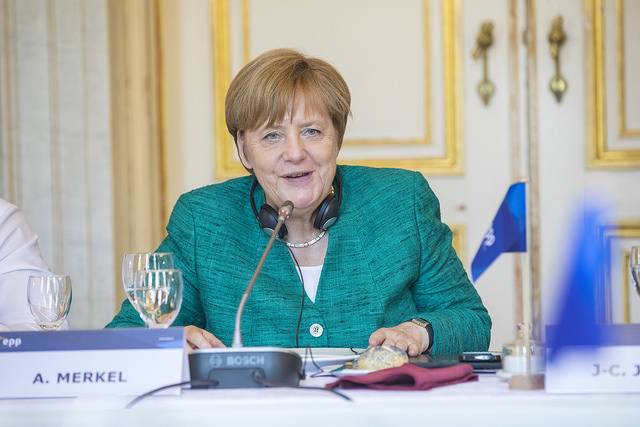
German Chancellor Angela Merkel and her government haven’t had a good couple of weeks.
After a tortuous, deeply divisive and increasingly acrimonious debate, Merkel’s Christian Democratic Union/Christian Social Union (CDU/CSU)—conservative coalition partners for almost 70 years—announced on 2 July that they had reached a compromise on how to deal with the flow of asylum seekers wanting to enter Germany.
At one stage, this political dispute looked like it might split the longstanding CDU/CSU partnership and, as a result, topple the grand coalition (GroKo) government between the CDU/CSU and the Social Democrats (SPD). Such an outcome would also almost certainly have meant the end of Merkel’s 13-year chancellorship of Germany.
Given the significant disarray within Europe and the parlous state of the transatlantic relationship, Merkel’s fall would have been a serious blow for Germany, the European project and the West.
Merkel had insisted—as she has for years now—that the only genuine solution to the asylum seeker influx was to be found at a Europe-wide level. This also underlined her unwavering opposition to anything that will weaken the EU and its institutions. She believes, wholeheartedly, in more European unity, not less.
Arrayed against her in Germany have been critics from within her own party (the CDU) and from the Bavarian-based CSU, both (but especially the CSU) driven by their alarm at the success of anti-immigrant parties on the far right, led by the Alternative for Germany (AfD).
The CSU lives in mortal fear that, unless tough steps are taken to stem the inflow of asylum seekers, it will be outflanked on the right by the AfD and lose its dominant position in Bavarian politics when state elections are held there in October.
The irony is that, in fact, the number of asylum seekers wanting to enter Germany (often across Bavaria’s borders) have fallen dramatically. In the first four months of 2018, asylum seeker numbers entering Germany fell by 20%, although Germany remains the ultimate preferred destination within the EU.
Also hostile to Merkel’s strong push for a European solution have been other EU governments wanting to take a much tougher line on asylum seekers, particularly populist/nationalist governments in Hungary, Austria, the Czech Republic and now Italy. Hungary has built a border fence; the new Italian government has recently refused entry to asylum seeker vessels crossing the Mediterranean.
Merkel’s view has been that closing borders to asylum seekers in Europe deeply undermines the EU’s free travel arrangements, especially the Schengen accord involving 26 European states which have abolished passport and border controls between them. This, in turn, severely damages a European institution that is one of the main building blocks of greater European unity. She also argues that problems will be exacerbated elsewhere if Germany (and others) block the entry of asylum seekers and return them to the countries where they first entered the European Union—the ‘Dublin rule’, which provides that asylum seekers are processed in their first country of entry.
Merkel thus rejected the ultimatum put to her by the new interior minister, Horst Seehofer from the CSU, that she agree to such a border closure and the automatic return of any asylum seeker already registered as first having entered another EU country. Seehofer indicated that, if she did not agree, he would implement it unilaterally, by decree. If Seehofer had gone ahead with his threat, Merkel would have had no choice but to sack him, most likely precipitating the end of the CDU/CSU alliance, the loss of the GroKo’s Bundestag majority and new elections.
In the end she persuaded Seehofer, her own critics and the CSU to let her first pursue a European solution at the 28–29 June EU summit. After a huge effort—and despite the intransigence of Giuseppe Conte, the new Italian prime minister—the EU leaders reached an agreement.
Back home, Merkel, faced with the threatened resignation of her interior minister, has since had to agree to most of what Seehofer and her party critics have demanded: so-called ‘transit camps’ on the German–Austrian border, stepped-up controls on that border and the return (albeit under administrative agreements yet to be negotiated) to their countries of first entry to the EU of asylum seekers already registered there.
Merkel has bought some time and reduced the tensions between the CDU and the CSU with the 2 July agreement, but there are still some serious challenges ahead. For a start, the SPD is deeply unhappy with the outcome and might not accept it. No SPD, no GroKo. And then countries like Austria—despite their anti-immigrant stance—could well be unhappy if Germany introduces even stricter entry controls on its border, thereby just shifting asylum seeker flows back to Austria (and others).
Negotiating the ‘administrative agreements’ on the return of asylum seekers to EU countries of first entry will also be extremely difficult. And it would be courageous to suggest that CDU/CSU tensions, let loose in the past couple of weeks, have gone away.
Most importantly, however, the Seehofer/CSU challenge itself and the outcome announced on Monday have underlined Angela Merkel’s growing weakness. However, she remains popular with Germans: a recent Emnid poll found that 47% of voters see her as the second-most-trustworthy German politician and her CDU/CSU bloc is still the most popular political grouping on 32%—close to the result it achieved in the 2017 Bundestag election.
A weaker Merkel isn’t good news for Germany, or for a divided Europe, when her leadership is needed more than ever—or for the world. She has had a political near-death experience. Let’s hope that things now settle down.

